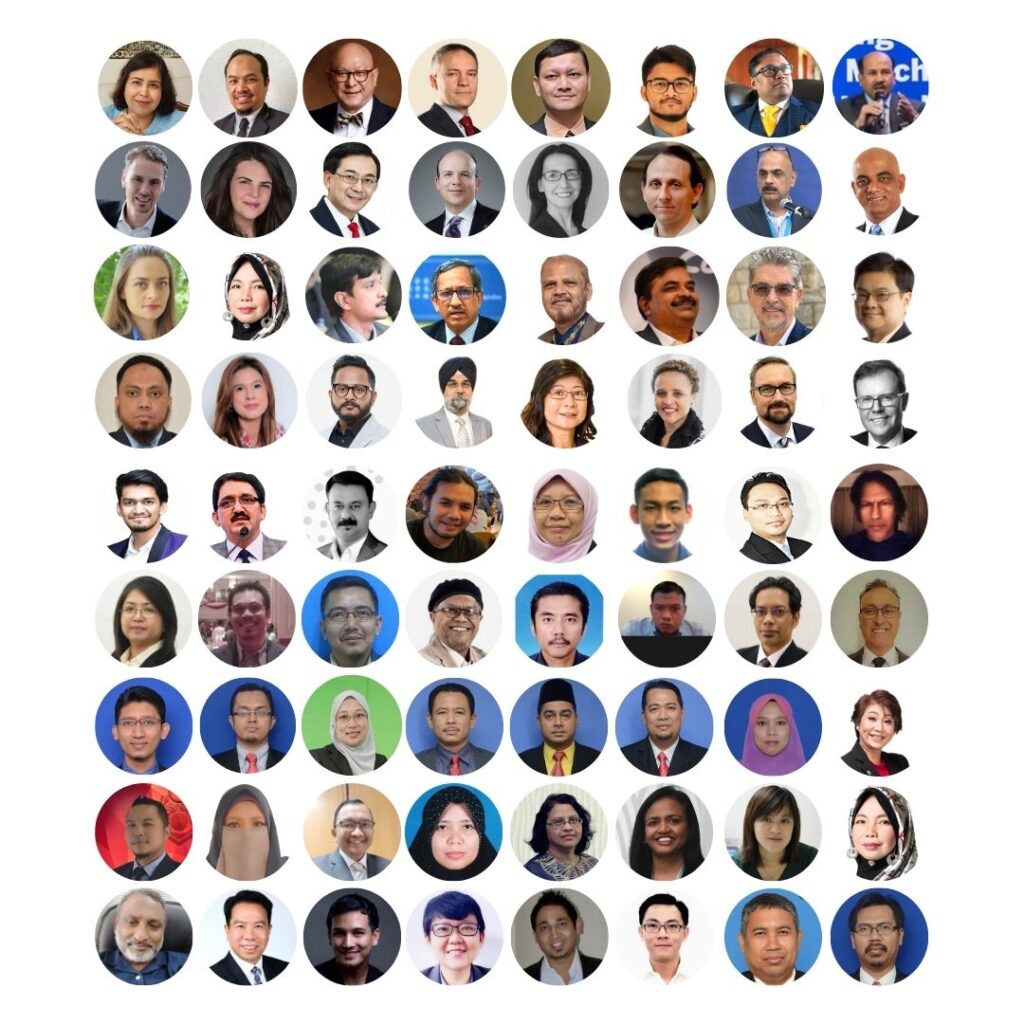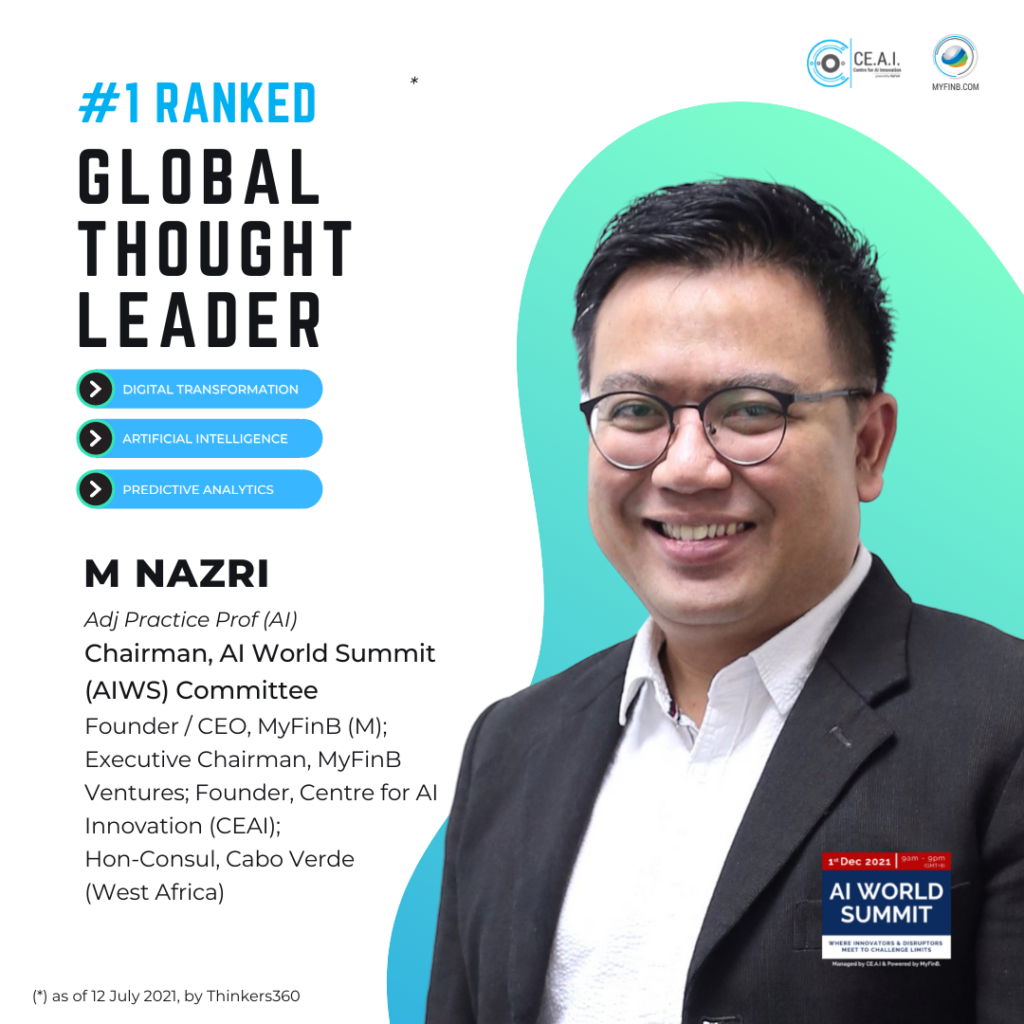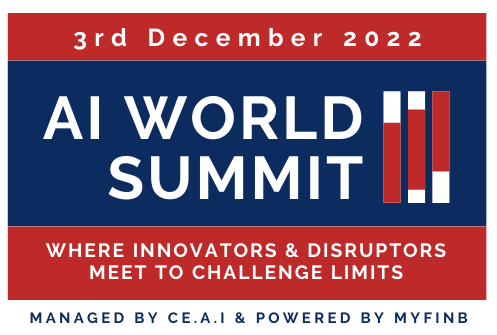

A Global Digital Event
AI WORLD SUMMIT 2023
‘The AI World Summit: Where Innovators & Disruptors Meet to Challenge Limits’ brings together the global AI community from a range of businesses, science and tech to go beyond the buzz and hype, discuss the most burning AI issues, share their developments, successes, challenges, and the resultant impact on their businesses.
The AI World Summit is a unique opportunity to explore what the new global era means to AI. It touches on how AI’s transformational potential can be best used to create a better future, and what this means for policy and decision makers, manufacturers and businesses interested in leveraging the potential, for the good of society and the business community.
What Past Participants Said About AIWS

Quote from Chairman, AIWS Committee
The AI World Summit is one of the world’s largest, most inclusive and vibrant events – when it comes to AI showcases, discussions and exchange of views, ideas and experiences in AI adoption and deployment by practitioners and global thought leaders.
The AIWS covers the hottest topics in AI and encourages a healthy debate, non-technical and strategic, for professionals, senior executives, board members and research personnel – ranging from public, private and non-profit organisations / NGOs.
AIWS provides a forum to encourage the discussion, planning and execution of social innovation projects - with AI as an enabler.
The 17 Tracks
Click on each track to see details.
End poverty in all its forms, everywhere.
Synopsis
Aligning with the UN Guiding Principles on Business and Human Rights, companies can now utilise AI technology to measure the standards of responsibility to respect human rights and labour rights. Parameters can be formulated in accordance with international standards which includes identifying and avoiding practices that perpetuate poverty traps.
Discussion points
This track explores how technologies like AI can be utilised to identify, prevent, mitigate; and account for how actual and potential human rights and labour practices impact their own operations and supply chains.
End hunger, achieve food security and improved nutrition and promote sustainable agriculture
Synopsis
Empowering the players in the agriculture supply chain through the use of AI technologies is an important driver to measure the effectiveness of food security and sustainable agriculture strategies. Farmers, producers, traders, retailers, investors and consumers can be equipped with smart tech to design and deliver effective, scalable and practical solutions. Data can be carefully evaluated across the food supply chain systems in order to advance food security, protect the environment and ensure economic opportunity.
Discussion topic
This track focuses on the use of technologies like AI to conduct responsible business and for responsible action and leadership from all actors in society.
Ensure healthy lives and promote well-being for all at all ages
Synopsis
Slow to embrace artificial intelligence (AI), healthcare organizations are accelerating the pace of adoption by establishing the organizational and technical infrastructure required and delivering use cases across the entire enterprise. With the COVID-19 pandemic, more concerted, technological efforts are required to achieve universal health coverage and sustainable financing for health.
Discussion points
This session focuses on how smart technologies can tackle antimicrobial resistance and environmental factors contributing to ill health. Discussions also touch on how AI can be an effective tool to ensure healthy lives and promote well-being with the outcome of building prosperous societies.
Ensure inclusive and equitable quality education and promote lifelong learning opportunities for all.
Synopsis
Artificial Intelligence (AI) in Education Market size exceeded USD 1 billion in 2020 and is expected to grow at a CAGR of over 40% between 2021 and 2027. The recent COVID-19 outbreak has increased the demand for online learning platforms across the globe. The increasing demand for online learning platforms has enabled enterprises to develop innovative AI-based learning solutions.
Discussion points
This track touches on strategies to ensure inclusive and quality education to enable upward socioeconomic mobility and escape poverty - such as improving students’ learning styles and offering personalized tutoring and high-quality education to the students by gauging their pre-existing knowledge and learning.
Achieve gender equality and empower all women and girls.
Synopsis
Across the globe, women and girls perform a disproportionate share of unpaid domestic work. Inequalities faced by girls can begin right at birth and follow them all their lives. Meanwhile, a 2020 World Economic Forum report, found that women make up only 26 percent of data and AI positions in the workforce, while the Stanford Institute for Human-Centered AI’s 2021 AI Index Report found that women make up just 16 percent of tenure-track faculty focused on AI globally.
Discussion points
This session explores intriguing insights on women representation in the tech sector, boardrooms and C-suite management; including how gender diversity, particularly among leadership positions, drives increased productivity, profitability, and market value for organizations across industries
Ensure availability and sustainable management of water and sanitation for all.
Synopsis
The demand for water has outpaced population growth, and half the world’s population is already experiencing severe water scarcity at least one month a year. It is therefore worthwhile to examine deeper on how AI can make the process of water management easier with data analytics, regression models, and algorithms. These cutting-edge technologies help in building efficient water systems and networks.
Discussion points
This track brings innovative minds together to brainstorm ideas for ways to deal with growing challenges linked to water scarcity, water pollution, degraded water-related ecosystems and cooperation over transboundary water basins.
Ensure access to affordable, reliable, sustainable, and modern energy for all.
Synopsis
AI has the potential to cut energy waste, lower energy costs, and facilitate and accelerate the use of clean renewable energy sources in power grids worldwide. This can include identifying where savings opportunities can be made from generation to understanding the energy invoice and billing accuracy, opportunities for strategy optimisation and even helping to manage energy procurement for a much lower cost.
Discussion points
This track covers strategic approaches on how to develop efficient, well-established energy system to support all sectors in an economy: from businesses, medicine and education to agriculture, infrastructure, communications and high-technology.
Promote sustained, inclusive, and sustainable economic growth, full and productive employment, and decent work for all.
Synopsis
Half the global workforce will require reskilling by 2025, according to the World Economic Forum (WEF). WEF predicts a seismic shift in terms of what roles are required, with 85 million jobs being redundant by 2025 and 97 million new roles being created. Given these predictions, it’s hardly surprising that reskilling and upskilling are still watchwords going into 2022.
Discussion points
This track discusses critical points on balancing sustained and inclusive economic growth strategies to drive progress, create decent jobs - with upskilling and reskilling efforts.
Build resilient infrastructure, promote inclusive and sustainable industrialization, and foster innovation.
Synopsis
Economic growth, social development and climate action are heavily dependent on investments in infrastructure, sustainable industrial development and technological progress. Smart cities, for example, can use artificial intelligence to see their effect on the local environment, global warming, as well as the pollution level. Using AI and machine learning within pollution control and energy consumption, allows authorities and cities to make well informed decisions that are best for the environment.
Discussion points
This track touches on how analyzing patterns and trends in data, businesses can optimize utilization, increase agility and meet time-to-market pressures. In doing so, businesses can effectively balance maintenance with innovation and drive the digital initiatives that propel business growth.
Reduce inequality within and among countries.
Synopsis
Despite some positive signs, inequality is growing for more than 70 per cent of the global population, exacerbating the risks of divisions and hampering economic and social development. Inequalities based on income, sex, age, disability, sexual orientation, race, class, ethnicity, religion and opportunity continue to persist across the world. Inequality threatens longterm social and economic development, harms poverty reduction and destroys people’s sense of fulfilment and self-worth. This, in turn, can breed crime, disease and environmental degradation.
Discussion points
This session examines how AI can address the issues of inequalities. Discuss how AI systems are built on learning from data, and if the data is skewed as per the view of the person building it, it can have major consequences.
Make cities and human settlements inclusive, safe, resilient and sustainable
Synopsis
Even before the coronavirus, rapid urbanization meant that 4 billion people – over half of the global population – in the world’s cities faced worsening air pollution, inadequate infrastructure and services, and unplanned urban sprawl. Over 90 per cent of COVID19 cases are occurring in urban areas, with the 1 billion residents of the world’s densely populated slums being hit the hardest. Successful examples of technology adoption to contain COVID-19 demonstrate the remarkable resilience and adaptability of urban communities in adjusting to new norms.
Discussion points
This track discusses strategic approaches including the use of smart technologies like AI, on how to make cities safe and sustainable. This covers areas of focus such as ensuring access to safe and affordable housing, investment in public transport, creating green public spaces, and improving urban planning and management in a participatory and inclusive manner.
Ensure availability and sustainable management of water and sanitation for all.
Synopsis
Sustainable consumption and production aims to produce more and better goods with less resources. The idea is to generate net welfare gains from economic activities by reducing resource use, degradation and pollution along the whole lifecycle, while increasing quality of life. Essentially, this is about doing more and better with less - especially with innovative technological approaches. It is also about decoupling economic growth from environmental degradation, increasing resource efficiency and promoting sustainable lifestyles.
Discussion points
This track discusses strategic approaches on the required improvements in resource efficiency, consideration of the entire life cycle of economic activities, and active engagement in multilateral environmental agreements.
Take urgent action to combat climate change and its impacts.
Synopsis
The climate crisis continues unabated as the global community shies away from the full commitment required for its reversal. 2010-2019 was warmest decade ever recorded, bringing with it massive wildfires, hurricanes, droughts, floods and other climate disasters across continents. Controlling our changing climate both requires environmental and biodiversity restoration, and will help recover habitats and biodiversity already threatened by climate change and its causes today.
Discussion points
This track centres on how AI has the potential to accelerate global efforts to protect the environment and conserve resources by detecting energy emission reductions, CO2 removal, helping develop greener transportation networks, monitoring deforestation, and predicting extreme weather conditions.
Conserve and sustainably use the oceans, seas, and marine resources for sustainable development.
Synopsis
Oceans are our planet’s life support and regulate the global climate system. They are the world’s largest ecosystem, home to nearly a million known species and containing vast untapped potential for scientific discovery. 30 percent of the world’s fish stocks are overexploited, reaching below the level at which they can produce sustainable yields, ocean acidification has risen 26 percent since the beginning of the industrial revolution, and an average of 13,000 pieces of plastic litter are found on every square kilometer of ocean.
Discussion points
This track discusses on opportunities through technological adoption, on how to chart a sustainable recovery path and measures to sustainably manage and protect marine and coastal ecosystems from pollution - as well as address the impact of ocean acidification.
Protect, restore, and promote sustainable use of terrestrial ecosystems, manage forests, combat desertification and biodiversity loss, and halt and reverse land degradation.
Synopsis
Forests cover nearly 31 per cent of our planet’s land area. From the air we breathe, to the water we drink, to the food we eat–forests sustain us. Forests are home to more than 80 per cent of all terrestrial species of animals, plants and insects. However, biodiversity is declining faster than at any other time in human history. Globally, one fifth of the Earth’s land area (more than 2 billion hectares) are degraded, an area nearly the size of India and the Russian Federation combined.
Discussion points
This track covers the effectiveness of biodiversity measures and the ecosystem services as the basis for climate change adaptation and disaster risk reduction strategies. This examines the extent to which they can deliver benefits that will increase the resilience of people to the impacts of climate change.
Promote peaceful and inclusive societies for sustainable development, provide access to justice for all, and build effective, accountable, and inclusive institutions.
Synopsis
People everywhere need to be free of fear from all forms of violence and feel safe as they go about their lives whatever their ethnicity, faith or sexual orientation. Conflict, insecurity, weak institutions and limited access to justice remain threats to sustainable development. In 2019, the number of people fleeing war, persecution and conflict exceeded 79.5 million, the highest level ever recorded. One in four children continues to be deprived of legal identity through lack of birth registration, often limiting their ability to exercise rights in other areas. The COVID-19 pandemic threatens to amplify and exploit fragilities across the globe.
Discussion points
This track provides a discussion on how technology as powerful and complex as AI, can lead to constructive dialogue and engagement between academia, industry and civil society to deal with aforementioned issues. This includes a thorough examination of how to maximize the benefits and minimizing the risks to human rights, democracy and human security.
Strengthen the means of implementation and revitalize the global partnership for sustainable development.
Synopsis
In light of the consequences of the global COVID-19 pandemic, we have seen that strengthening multilateralism and global partnerships are more important than ever if we are to solve the world’s problems. The Sustainable Developmet Goals remain the framework for building back better.
Discussion points
The focus of this track is to discuss innovative approaches to foster and contribute to the responsible development, use and governance of human-centred AI systems, in congruence with the UN Sustainable Development Goals. These include projects and frameworks to operationalize AI ethical principles and the application of AI for social good;, mechanisms and processes to identify and mitigate bias, discrimination, and inequities in AI systems as well as tools, certifications, assessments, and audit mechanisms to evaluate AI systems for responsibility and trustworthiness.
AIWS III: Priority Focus and Features
- The Grand Finale: 6th December 2023. A series of short interviews will be conducted with speakers individually and digitally curated based on each track.
- Total of 17 tracks : The latest, hottest AI trends that 1linked to 17 Sustainable Development Goals (SDGs). Numerous speakers globally invited to share their thoughts on a specific set of questions.
- Converted into posters and digital clips; promoting digitally to a global audience of 11m professionals; digital networking via a knowledge portal.
- Publication of AI Playbook based on inputs collated from all speakers across tracks. Sentiment index relating to the 17 tracks will be measured and incorporated into the book over a 12-month period.
- Digital networking - continuously throughout the year. Participants can interact with one another before, during and after the event.

Who Should Attend
AI / Analytics Experts
Data Scientists, Technical Personnel, Innovators, Transformation Leaders
Public & Private Organisations
Businesses, MNCs, Start-ups, Government Agencies, Universities and Colleges, Trade Associations and Business Chambers, Non-profit Organisations, Banks and Financial Institutions
Professionals & Academists
Professionals, Investors, Researchers, Lecturers, Students
What Is Special This Time?
Series of roundtable discussions leading to grand finale
Curated content and quotes from experts globally in various fields
Sentiment index and emerging trends across core tracks
Publication of AI Playbook across Core Tracks
Launch: Non-Fungible Tokens of Social Innovation Projects
Past AIWS Events: Recap
AIWS 20/21 was a huge success.
More details are being updated. Should you have any questions, please feel free to write to us at aisummit@myfinb.com
If you are interested to become a speaker at AIWS 21/22, please kindly fill up the form below.
Go to form: https://www.ceaiglobal.com/aiws-3rd/speaker-form
